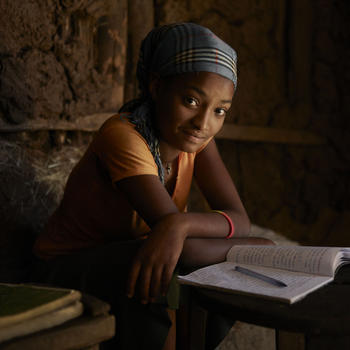Everyone benefits from clean water, decent toilets and good hygiene – but women and girls stand to gain the most.
Typically responsible for domestic chores, it's usually women and girls who are expected to collect water from unsafe sources like rivers, streams and holes in the ground. The journey is often dangerous, and the sheer weight of full containers can leave life-long injuries.
The time spent fetching water – often hours, every single day – is time that could be better spent in school, earning a living, or with family.
I’m never late for school now as the water is nearby, so it doesn’t take much time to collect it.
15-year-old Tsehaynesh used to start her day by walking to a spring to fetch water for her family. Despite setting off early every morning, she was often late for school, and struggled to catch up.
Now, with three water points in her community in Derekwa, Ethiopia, she can spend her time and energy on what really matters: her education, and working towards her ambition of becoming a nurse.
The importance of decent toilets and good hygiene
Almost 1.7 billion people don't have a toilet, leaving many with no choice but to go outside.
It’s not just undignified, but it’s unsafe too – and women and girls are particularly at risk of harassment, violence, and sexual assault. To avoid having to go in open fields, some wait until nightfall, putting them in even greater danger, and negatively impacting their health.
A lack of toilets and washing facilities makes managing periods much more challenging. When there are no facilities at school, at work, or in public places, many women and girls simply stay at home every month.
It was very difficult for the women to go as we wanted to, but the men used to go whenever they liked... We'd spend the entire day without even peeing.
Farmer Abez Mekonnen, who, with the support of our local partners, recently built her own toilet in Ethiopia's Amhara region.
“These days I attend school even during my period”
Until recently, 14-year-old Anjali would rather stay home than use the dirty, broken toilet at her school in Lahan, Nepal. But with renovated facilities, clean water, and a new menstrual hygiene room, Anjali’s back in the classroom – no matter the time of the month.

Maternal health
With clean water in health centres, like this one in Kampala, mothers like Praise Mpamire can give birth safely and with dignity – and babies can get the best possible start in life.
Every two seconds, a woman gives birth in a health centre without clean water, decent toilets or good hygiene.
That’s over 16 million women a year facing not only difficulty and indignity, but the risk of deadly infection for both themselves and their babies.
With a reliable supply of water, staff can keep wards and equipment clean and safe. With working taps, medics can wash their hands when they need to, and encourage their patients to do the same. And with decent toilets and washing facilities, women can give birth in safety and dignity.
Carrying Life: Motherhood and water in Malawi
Photographer Laura El-Tantway’s striking images explore the challenges of pregnancy and childbirth without clean water and hygiene facilities in Malawi's Ntchisi district – and reveal the transformation these vital services bring.

The unequal burden of climate change
The climate crisis is a water crisis – and women and girls are already feeling the impacts.
As more frequent droughts cause rivers and springs to dry up, the journey to fetch water is only getting longer, hotter, and more dangerous.
Extreme weather events like floods are becoming more common and severe, damaging pipes, polluting water sources, and washing away toilets – and it's women and girls whose health, dignity and wellbeing suffer the most.
Women and girls are key to solutions
When women – like Fatimata Coulibaly, in charge of water management in her community of Samabogo, Mali – are included in decision-making and problem-solving, everyone gains.
Too often, women and girls are left out of conversations, because of traditional gender roles and power structures.
When services are designed and run solely by men, they ignore women’s valuable perspectives and first-hand experiences. As a result, solutions don’t always meet communities’ needs.
That's why we:
Every day – at home, in the classroom, as part of community groups – women and girls are coming up with practical solutions to problems, and leading the response to climate change.
They’re fixing taps and pumps. They’re organising change. And they’re taking on even more responsibilities, volunteering as peer educators, hygiene promoters, and water monitors.
“I take this as a responsibility to help the whole village”
Residents of Bonam, Burkina Faso*, are used to long dry seasons – but water is becoming increasingly scarce. As a volunteer trained by our local partner, Justine Sawadogo is responsible for monitoring the rain gauge, helping to build a picture of the village reserves.

*Our work in Bonam, Burkina Faso, has been made possible thanks to players of the People's Postcode Lottery.



